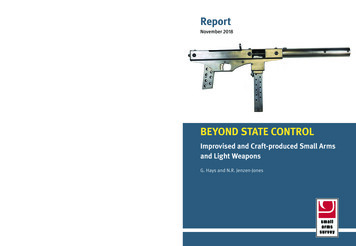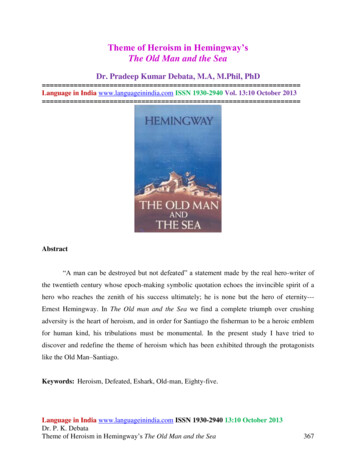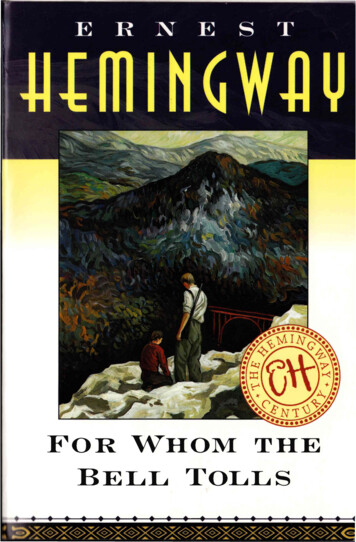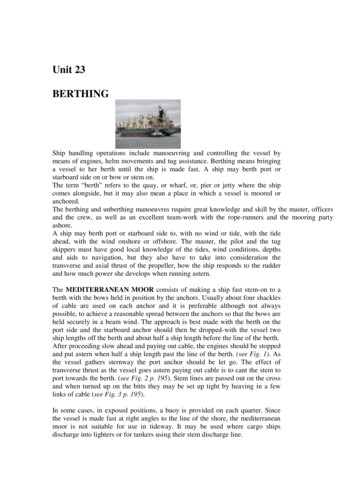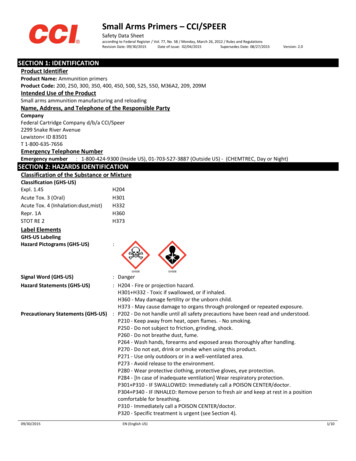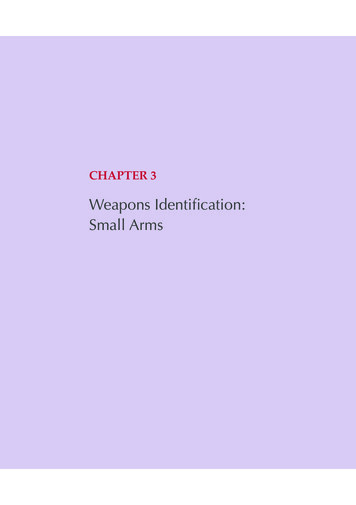
Transcription
A Farewell to ArmsBYErnest Hemingway
Book One1In the late summer of that year we lived in a house in a village that looked across theriver and the plain to the mountains. In the bed of the river there were pebbles andboulders, dry and white in the sun, and the water was clear and swiftly moving andblue in the channels. Troops went by the house and down the road and the dust theyraised powdered the leaves of the trees. The trunks of the trees too were dusty andthe leaves fell early that year and we saw the troops marching along the road andthe dust rising and leaves, stirred by the breeze, falling and the soldiers marchingand afterward the road bare and white except for the leaves. The plain was rich withcrops; there were many orchards of fruit trees and beyond the plain the mountainswere brown and bare. There was fighting in the mountains and at night we could seethe flashes from the artillery. In the dark it was like summer lightning, but the nightswere cool and there was not the feeling of a storm coming. Sometimes in the darkwe heard the troops marching under the window and guns going past pulled bymotor-tractors. There was much traffic at night and many mules on the roads withboxes of ammunition on each side of their pack-saddles and gray motor trucks thatcarried men, and other trucks with loads covered with canvas that moved slower inthe traffic. There were big guns too that passed in the day drawn by tractors, thelong barrels of the guns covered with green branches and green leafy branches andvines laid over the tractors. To the north we could look across a valley and see aforest of chestnut trees and behind it another mountain on this side of the river.There was fighting for that mountain too, but it was not successful, and in the fallwhen the rains came the leaves all fell from the chestnut trees and the brancheswere bare and the trunks black with rain. The vineyards were thin and barebranched too and all the country wet and brown and dead with the autumn. Therewere mists over the river and clouds on the mountain and the trucks splashed mudon the road and the troops were muddy and wet in their capes; their rifles were wetand under their capes the two leather cartridge-boxes on the front of the belts, grayleather boxes heavy with the packs of clips of thin, long 6.5 mm. cartridges, bulgedforward under the capes so that the men, passing on the road, marched as thoughthey were six months gone with child. There were small gray motor cars that passedgoing very fast; usually there was an officer on the seat with the driver and moreofficers in the back seat. They splashed more mud than the camions even and if oneof the officers in the back was very small and sitting between two generals, hehimself so small that you could not see his face but only the top of his cap and hisnarrow back, and if the car went especially fast it was probably the King. He lived inUdine and came out in this way nearly every day to see how things were going, andthings went very badly. At the start of the winter came the permanent rain and withthe rain came the cholera. But it was checked and in the end only seven thousanddied of it in the army.2The next year there were many victories. The mountain that was beyond the valleyand the hillside where the chestnut forest grew was captured and there werevictories beyond the plain on the plateau to the south and we crossed the river inAugust and lived in a house in Gorizia that had a fountain and many thick shadytrees in a walled garden and a wistaria vine purple on the side of the house. Now thefighting was in the next mountains beyond and was not a mile away. The town wasvery nice and our house was very fine. The river ran behind us and the town had
been captured very handsomely but the mountains beyond it could not be taken andI was very glad the Austrians seemed to want to come back to the town some time, ifthe war should end, because they did not bombard it to destroy it but only a little in amilitary way. People“A Farewell to Arms” By Ernest Hemingway 3
lived on in it and there were hospitals and cafés and artillery up side streets and twobawdy houses, one for troops and one for officers, and with the end of the summer,the cool nights, the fighting in the mountains beyond the town, the shell-marked ironof the railway bridge, the smashed tunnel by the river where the fighting had been,the trees around the square and the long avenue of trees that led to the square;these with there being girls in the town, the King passing in his motor car, sometimesnow seeing his face and little long necked body and gray beard like a goat’s chin tuft;all these with the sudden interiors of houses that had lost a wall through shelling,with plaster and rubble in their gardens and sometimes in the street, and the wholething going well on the Carso made the fall very different from the last fall when wehad been in the country. The war was changed too. The forest of oak trees on themountain beyond the town was gone. The forest had been green in the summerwhen we had come into the town but now there were the stumps and the brokentrunks and the ground torn up, and one day at the end of the fall when I was outwhere the oak forest had been I saw a cloud coming over the mountain. It came veryfast and the sun went a dull yellow and then everything was gray and the sky wascovered and the cloud came on down the mountain and suddenly we were in it and itwas snow. The snow slanted across the wind, the bare ground was covered, thestumps of trees projected, there was snow on the guns and there were paths in thesnow going back to the latrines behind trenches. Later, below in the town, I watchedthe snow falling, looking out of the window of the bawdy house, the house forofficers, where I sat with a friend and two glasses drinking a bottle of Asti, and,looking out at the snow falling slowly and heavily, we knew it was all over for thatyear. Up the river the mountains had not been taken; none of the mountains beyondthe river had been taken. That was all left for next year. My friend saw the priest fromour mess going by in the street, walking carefully in the slush, and pounded on thewindow to attract his attention. The priest looked up. He saw us and smiled. Myfriend motioned for him to come in. The priest shook his head and went on. Thatnight in the mess after the spaghetti course, which every one ate very quickly andseriously, lifting the spaghetti on the fork until the loose strands hung clear thenlowering it into the mouth, or else using a continuous lift and sucking into the mouth,helping ourselves to wine from the grass-covered gallon flask; it swung in a metalcradle and you pulled the neck of the flask down with the forefinger and the wine,clear red, tannic and lovely, poured out into the glass held with the same hand; afterthis course, the captain commenced picking on the priest. The priest was young andblushed easily and wore a uniform like the rest of us but with a cross in dark redvelvet above the left breast pocket of his gray tunic. The captain spoke pidgin Italianfor my doubtful benefit, in order that I might understand perfectly, that nothing shouldbe lost. “Priest to-day with girls,” the captain said looking at the priest and at me. Thepriest smiled and blushed and shook his head. This captain baited him often. “Nottrue?” asked the captain. “To-day I see priest with girls.” “No,” said the priest. Theother officers were amused at the baiting. “Priest not with girls,” went on the captain.“Priest never with girls,” he explained to me. He took my glass and filled it, looking atmy eyes all the time, but not losing sight of the priest. “Priest every night five againstone.” Every one at the table laughed. “You understand? Priest every night fiveagainst one.” He made a gesture and laughed loudly. The priest accepted it as ajoke. “The Pope wants the Austrians to win the war,” the major said. “He loves FranzJoseph. That’s where the money comes from. I am an atheist.” “Did you ever readthe ‘Black Pig’?” asked the lieutenant. “I will get you a copy. It was that which shook
my faith.” “It is a filthy and vile book,” said the priest. “You do not really like it.” “It isvery valuable,” said the lieutenant. “It tells you about those priests. You will like
“A Farewell to Arms” By Ernest Hemingway 4
it,” he said to me. I smiled at the priest and he smiled back across the candle-light.“Don’t you read it,” he said. “I will get it for you,” said the lieutenant. “All thinking menare atheists,” the major said. “I do not believe in the Free Masons however.” “Ibelieve in the Free Masons,” the lieutenant said. “It is a noble organization.” Someone came in and as the door opened I could see the snow falling. “There will be nomore offensive now that the snow has come,” I said. “Certainly not,” said the major.“You should go on leave. You should go to Rome, Naples, Sicily—” “He should visitAmalfi,” said the lieutenant. “I will write you cards to my family in Amalfi. They willlove you like a son.” “He should go to Palermo.” “He ought to go to Capri.” “I wouldlike you to see Abruzzi and visit my family at Capracotta,” said the priest. “Listen tohim talk about the Abruzzi. There’s more snow there than here. He doesn’t want tosee peasants. Let him go to centres of culture and civilization.” “He should have finegirls. I will give you the addresses of places in Naples. Beautiful young girls—accompanied by their mothers. Ha! Ha! Ha!” The captain spread his hand open, thethumb up and fingers outspread as when you make shadow pictures. There was ashadow from his hand on the wall. He spoke again in pidgin Italian. “You go awaylike this,” he pointed to the thumb, “and come back like this,” he touched the littlefinger. Every one laughed. “Look,” said the captain. He spread the hand again. Againthe candle-light made its shadows on the wall. He started with the upright thumb andnamed in their order the thumb and four fingers, “soto-tenente (the thumb), tenente(first finger), capitano (next finger), maggiore (next to the little finger), andtenentecolonello (the little finger). You go away soto-tenente! You come back sotocolonello!” They all laughed. The captain was having a great success with fingergames. He looked at the priest and shouted, “Every night priest five against one!”They all laughed again. “You must go on leave at once,” the major said. “I would liketo go with you and show you things,” the lieutenant said. “When you come backbring a phonograph.” “Bring good opera disks.” “Bring Caruso.” “Don’t bring Caruso.He bellows.” “Don’t you wish you could bellow like him?” “He bellows. I say hebellows!” “I would like you to go to Abruzzi,” the priest said. The others wereshouting. “There is good hunting. You would like the people and though it is cold it isclear and dry. You could stay with my family. My father is a famous hunter.” “Comeon,” said the captain. “We go whorehouse before it shuts.” “Good-night,” I said to thepriest. “Good-night,” he said.3When I came back to the front we still lived in that town. There were many moreguns in the country around and the spring had come. The fields were green andthere were small green shoots on the vines, the trees along the road had smallleaves and a breeze came from the sea. I saw the town with the hill and the oldcastle above it in a cup in the hills with the mountains beyond, brown mountains witha little green on their slopes. In the town there were more guns, there were somenew hospitals, you met British men and sometimes women, on the street, and a fewmore houses had been hit by shell fire. Jt was warm and like the spring and I walkeddown the alleyway of trees, warmed from“A Farewell to Arms” By Ernest Hemingway 5
the sun on the wall, and found we still lived in the same house and that it all lookedthe same as when I had left it. The door was open, there was a soldier sitting on abench outside in the sun, an ambulance was waiting by the side door and inside thedoor, as I went in, there was the smell of marble floors and hospital. It was all as Ihad left it except that now it was spring. I looked in the door of the big room and sawthe major sitting at his desk, the window open and the sunlight coming into the room.He did not see me and I did not know whether to go in and report or go upstairs firstand clean up. I decided to go on upstairs. The room I shared with the lieutenantRinaldi looked out on the courtyard. The window was open, my bed was made upwith blankets and my things hung on the wall, the gas mask in an oblong tin can, thesteel helmet on the same peg. At the foot of the bed was my flat trunk, and my winterboots, the leather shiny with oil, were on the trunk. My Austrian sniper’s rifle with itsblued octagon barrel and the lovely dark walnut, cheek-fitted, schutzen stock, hungover the two beds. The telescope that fitted it was, I remembered, locked in thetrunk. The lieutenant, Rinaldi, lay asleep on the other bed. He woke when he heardme in the room and sat up. “Ciaou!” he said. “What kind of time did you have?”“Magnificent.” We shook hands and he put his arm around my neck and kissed me.“Oughf,” I said. “You’re dirty,” he said. “You ought to wash. Where did you go andwhat did you do? Tell me everything at once.” “I went everywhere. Milan, Florence,Rome, Naples, Villa San Giovanni, Messina, Taormina—” “You talk like a time-table.Did you have any beautiful adventures?” “Yes.” “Where?” “Milano, Firenze, Roma,Napoli—” “That’s enough. Tell me really what was the best.” “In Milano.” “That wasbecause it was first. Where did you meet her? In the Cova? Where did you go? Howdid you feel? Tell me everything at once. Did you stay all night?” “Yes.” “That’snothing. Here now we have beautiful girls. New girls never been to the front before.”“Wonderful.” “You don’t believe me? We will go now this afternoon and see. And inthe town we have beautiful English girls. I am now in love with Miss Barkley. I willtake you to call. I will probably marry Miss Barkley.” “I have to get washed andreport. Doesn’t anybody work now?” “Since you are gone we have nothing butfrostbites, chilblains, jaundice, gonorrhea, self-inflicted wounds, pneumonia and hardand soft chancres. Every week some one gets wounded by rock fragments. Thereare a few real wounded. Next week the war starts again. Perhaps it start again. Theysay so. Do you think I would do right to marry Miss Barkley—after the war ofcourse?” “Absolutely,” I said and poured the basin full of water. “To-night you will tellme everything,” said Rinaldi. “Now I must go back to sleep to be fresh and beautifulfor Miss Barkley.” I took off my tunic and shirt and washed in the cold water in thebasin. While I rubbed myself with a towel I looked around the room and out thewindow and at Rinaldi lying with his eyes closed on the bed. He was good-looking,was my age, and he came from Amalfi. He loved being a surgeon and we were greatfriends. While I was looking at him he opened his eyes. “Have you any money?”“Yes.”
“A Farewell to Arms” By Ernest Hemingway 6
“Loan me fifty lire.” I dried my hands and took out my pocket-book from the inside ofmy tunic hanging on the wall. Rinaldi took the note, folded it without rising from thebed and slid it in his breeches pocket. He smiled, “I must make on Miss Barkley theimpression of a man of sufficient wealth. You are my great and good friend andfinancial protector.” “Go to hell,” I said. That night at the mess I sat next to the priestand he was disappointed and suddenly hurt that I had not gone to the Abruzzi. Hehad written to his father that I was coming and they had made preparations. I myselffelt as badly as he did and could not understand why I had not gone. It was what Ihad wanted to do and I tried to explain how one thing had led to another and finallyhe saw it and understood that I had really wanted to go and it was almost all right. Ihad drunk much wine and afterward coffee and Strega and I explained, winefully,how we did not do the things we wanted to do; we never did such things. We twowere talking while the others argued. I had wanted to go to Abruzzi. I had gone to noplace where the roads were frozen and hard as iron, where it was clear cold and dryand the snow was dry and powdery and hare-tracks in the snow and the peasantstook off their hats and called you Lord and there was good hunting. I had gone to nosuch place but to the smoke of cafés and nights when the room whirled and youneeded to look at the wall to make it stop, nights in bed, drunk, when you knew thatthat was all there was, and the strange excitement of waking and not knowing who itwas with you, and the world all unreal in the dark and so exciting that you mustresume again unknowing and not caring in the night, sure that this was all and alland all and not caring. Suddenly to care very much and to sleep to wake with itsometimes morning and all that had been there gone and everything sharp and hardand clear and sometimes a dispute about the cost. Sometimes still pleasant andfond and warm and breakfast and lunch. Sometimes all niceness gone and glad toget out on the street but always another day starting and then another night. I tried totell about the night and the difference between the night and the day and how thenight was better unless the day was very clean and cold and I could not tell it; as Icannot tell it now. But if you have had it you know. He had not had it but heunderstood that I had really wanted to go to the Abruzzi but had not gone and wewere still friends, with many tastes alike, but with the difference between us. He hadalways known what I did not know and what, when I learned it, I was always able toforget. But I did not know that then, although I learned it later. In the meantime wewere all at the mess, the meal was finished, and the argument went on. We twostopped talking and the captain shouted, “Priest not happy. Priest not happy withoutgirls.” “I am happy,” said the priest. “Priest not happy. Priest wants Austrians to winthe war,” the captain said. The others listened. The priest shook his head. “No,” hesaid. “Priest wants us never to attack. Don’t you want us never to attack?” “No. Ifthere is a war I suppose we must attack.” “Must attack. Shall attack!” The priestnodded. “Leave him alone,” the major said. “He’s all right.” “He can’t do anythingabout it anyway,” the captain said. We all got up and left the table.4The battery in the next garden woke me in the morning and I saw the sun comingthrough the window and got out of the bed. I went to the window and looked out. Thegravel paths were moist and the grass was wet with dew. The battery fired twice andthe air came each time like a blow and shook the window and made the front of mypajamas“A Farewell to Arms” By Ernest Hemingway 7
flap. I could not see the guns but they were evidently firing directly over us. It was anuisance to have them there but it was a comfort that they were no bigger. As Ilooked out at the garden I heard a motor truck starting on the road. I dressed, wentdownstairs, had some coffee in the kitchen and went out to the garage. Ten carswere lined up side by side under the long shed. They were top-heavy, blunt-nosedambulances, painted gray and built like moving-vans. The mechanics were workingon one out in the yard. Three others were up in the mountains at dressing stations.“Do they ever shell that battery?” Tasked one of the mechanics. “No, SignorTenente. It is protected by the little hill.” “How’s everything?” “Not so bad. Thismachine is no good but the others march.” He stopped working and smiled. “Wereyou on permission?” “Yes.” He wiped his hands on his jumper and grinned. “Youhave a good time?” The others all grinned too. “Fine,” I said. “What’s the matter withthis machine?” “It’s no good. One thing after another.” “What’s the matter now?”“New rings.” I left them working, the car looking disgraced and empty with the engineopen and parts spread on the work bench, and went in under the shed and looked ateach of the cars. They were moderately clean, a few freshly washed, the othersdusty. I looked at the tires carefully, looking for cuts or stone bruises. Everythingseemed in good condition. It evidently made no difference whether I was there tolook after things or not. I had imagined that the condition of the cars, whether or notthings were obtainable, the smooth functioning of the business of removing woundedand sick from the dressing stations, hauling them back from the mountains to theclearing station and then distributing them to the hospitals named on their papers,depended to a considerable extent on myself. Evidently it did not matter whether Iwas there or not. “Has there been any trouble getting parts?” I asked the sergeantmechanic. “No, Signor Tenente.” “Where is the gasoline park now?” “At the sameplace.” “Good,” I said and went back to the house and drank another bowl of coffeeat the mess table. The coffee was a pale gray and sweet with condensed milk.Outside the window it was a lovely spring morning. There was that beginning of afeeling of dryness in the nose that meant the day would be hot later on. That day Ivisited the posts in the mountains and was back in town late in the afternoon. Thewhole thing seemed to run better while I was away. The offensive was going to startagain I heard. The division for which we worked were to attack at a place up the riverand the major told me that I would see about the posts for during the attack. Theattack would cross the river up above the narrow gorge and spread up the hillside.The posts for the cars would have to be as near the river as they could get and keepcovered. They would, of course, be selected by the infantry but we were supposed towork it out. It was one of those things that gave you a false feeling of soldiering. Iwas very dusty and dirty and went up to my room to wash. Rinaldi was sitting on thebed with a copy of Hugo’s English grammar. He was dressed, wore his black boots,and his hair shone. “Splendid,” he said when he saw me. “You will come with me tosee Miss Barkley.” “No. “Yes. You will please come and make me a good impressionon her.” “All right. Wait till I get cleaned up.” “Wash up and come as you are.” Iwashed, brushed my hair and we started.
“A Farewell to Arms” By Ernest Hemingway 8
“Wait a minute,” Rinaldi said. “Perhaps we should have a drink.” He opened his trunkand took out a bottle. “Not Strega,” I said. “No. Grappa.” “All right.” He poured twoglasses and we touched them, first fingers extended. The grappa was very strong.“Another?” “All right,” I said. We drank the second grappa, Rinaldi put away thebottle and we went down the stairs. It was hot walking through the town but the sunwas starting to go down and it was very pleasant. The British hospital was a big villabuilt by Germans before the war. Miss Barkley was in the garden. Another nurse waswith her. We saw their white uniforms through the trees and walked toward them.Rinaldi saluted. I saluted too but more moderately. “How do you do?” Miss Barkleysaid. “You’re not an Italian, are you?” “Oh, no.” Rinaldi was talking with the othernurse. They were laughing. “What an odd thing—to be in the Italian army.” “It’s notreally the army. It’s only the ambulance.” “It’s very odd though. Why did you do it?” “Idon’t know,” I said. “There isn’t always an explanation for everything.” “Oh, isn’tthere? I was brought up to think there was.” “That’s awfully nice.” “Do we have to goon and talk this way?” “No,” I said. “That’s a relief. Isn’t it?” “What is the stick?” Iasked. Miss Barkley was quite tall. She wore what seemed to me to be a nurse’suniform, was blonde and had a tawny skin and gray eyes. I thought she was verybeautiful. She was carrying a thin rattan stick like a toy riding-crop, bound in leather.“It belonged to a boy who was killed last year.” “I’m awfully sorry.” “He was a verynice boy. He was going to marry me and he was killed in the Somme.” “It was aghastly show.” “Were you there?” “No.” “I’ve heard about it,” she said. “There’s notreally any war of that sort down here. They sent me the little stick. His mother sent itto me. They returned it with his things.” “Had you been engaged long?” “Eight years.We grew up together.” “And why didn’t you marry?” “I don’t know,” she said. “I was afool not to. I could have given him that anyway. But I thought it would be bad forhim.” “I see.” “Have you ever loved any one?” “No,” I said. We sat down on a benchand I looked at her. “You have beautiful hair,” I said. “Do you like it?” “Very much.” “Iwas going to cut it all off when he died.” “No.” “I wanted to do something for him. Yousee I didn’t care about the other thing and he could have had it all. He could havehad anything he wanted if I would have known. I would have married him oranything. I know all about it now. But then he wanted to go to
“A Farewell to Arms” By Ernest Hemingway 9
war and I didn’t know.” I did not say anything. “I didn’t know about anything then. Ithought it would be worse for him. I thought perhaps he couldn’t stand it and then ofcourse he was killed and that was the end of it.” “I don’t know.” “Oh, yes,” she said.“That’s the end of it.” We looked at Rinaldi talking with the other nurse. “What is hername?” “Ferguson. Helen Ferguson. Your friend is a doctor, isn’t he?” “Yes. He’svery good.” “That’s splendid. You rarely find any one any good this close to the front.This is close to the front, isn’t it?” “Quite.” “It’s a silly front,” she said. “But it’s verybeautiful. Are they going to have an offensive?” “Yes.” “Then we’ll have to work.There’s no work now.” “Have you done nursing long?” “Since the end of ‘fifteen. Istarted when he did. I remember having a silly idea he might come to the hospitalwhere I was. With a sabre cut, I suppose, and a bandage around his head. Or shotthrough the shoulder. Something picturesque.” “This is the picturesque front,” I said.“Yes,” she said. “People can’t realize what France is like. If they did, it couldn’t all goon. He didn’t have a sabre cut. They blew him all to bits.” I didn’t say anything. “Doyou suppose it will always go on?” “No.” “What’s to stop it?” “It will cracksomewhere.” “We’ll crack. We’ll crack in France. They can’t go on doing things likethe Somme and not crack.” “They won’t crack here,” I said. “You think not?” “No.They did very well last summer.” “They may crack,” she said. “Anybody may crack.”“The Germans too.” “No,” she said. “I think not.” We went over toward Rinaldi andMiss Ferguson. “You love Italy?” Rinaldi asked Miss Ferguson in English. “Quitewell.” “No understand,” Rinaldi shook his head. “Abbastanza bene,” I translated. Heshook his head. “That is not good. You love England?” “Not too well. I’m Scotch, yousee.” Rinaldi looked at me blankly. “She’s Scotch, so she loves Scotland better thanEngland,” I said in Italian. “But Scotland is England.” I translated this for MissFerguson. “Pas encore,” said Miss Ferguson. “Not really?” “Never. We do not likethe English.” “Not like the English? Not like Miss Barkley?” “Oh, that’s different. Youmustn’t take everything so literally.” After a while we said good-night and left.Walking home Rinaldi said, “Miss Barkley
“A Farewell to Arms” By Ernest Hemingway 10
prefers you to me. That is very clear. But the little Scotch one is very nice.” “Very,” Isaid. I had not noticed her. “You like her?” “No,” said Rinaldi.5The next afternoon I went to call on Miss Barkley again. She was not in the gardenand I went to the side door of the villa where the ambulances drove up. Inside I sawthe head nurse, who said Miss Barkley was on duty—”there’s a war on, you know.” Isaid I knew. “You’re the American in the Italian army?” she asked. “Yes, ma’am.”“How did you happen to do that? Why didn’t you join up with us?” “I don’t know,” Isaid. “Could I join now?” “I’m afraid not now. Tell me. Why did you join up with theItalians?” “I was in Italy,” I said, “and I spoke Italian.” “Oh,” she said. “I’m learning it.It’s beautiful language.” “Somebody said you should be able to learn it in two weeks.”“Oh, I’ll not learn it in two weeks. I’ve studied it for months now. You may come andsee her after seven o’clock if you wish. She’ll be off then. But don’t bring a lot ofItalians.” “Not even for the beautiful language?” “No. Nor for the beautiful uniforms.”“Good evening,” I said. “A rivederci, Tenente.” “A rivederla.” I saluted and went out. Itwas impossible to salute foreigners as an Italian, without embarrassment. The Italiansalute never seemed made for export. The day had been hot. I had been up the riverto the bridgehead at Plava. It was there that the offensive was to begin. It had beenimpossible to advance on the far side the year before because there was only oneroad leading down from the pass to the pontoon bridge and it was under machinegun and shell fire for nearly a mile. It was not wide enough either to carry all thetransport for an offensive and the Austrians could make a shambles out of it. But theItalians had crossed and spread out a little way on the far side to hold about a mileand a half on the Austrian side of the river. It was a nasty place and the Austriansshould not have let them hold it. I suppose it was mutual tolerance because theAustrians still kept a bridgehead further down the river. The Austrian trenches wereabove on the hillside only a few yards from the Italian lines. There had been a littletown but it was all rubble. There was what was left of a railway station and asmashed permanent bridge that could not be repaired and used because it was inplain sight. I went along the narrow road down toward the river, left the car at thedressing station under the hill, crossed the pontoon bridge, which was protected by ashoulder of the mountain, and went through the trenches in the smashed-down townand along the edge of the slope. Everybody was in the dugouts. There were racks ofrockets standing
velvet above the left breast pocket of his gray tunic. The captain spoke pidgin Italian for my doubtful benefit, in order that I might understand perfectly, that nothing should be lost. “Priest to-day with girls,” the captain said looking at the priest and at me. The priest smiled and b
